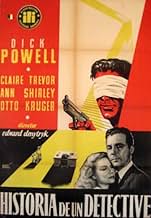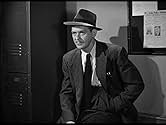NOTE IMDb
7,5/10
15 k
MA NOTE
Après avoir été embauché pour retrouver l'ancienne petite-amie d'un ex-détenu, Philip Marlowe est entraîné dans un réseau profondément complexe de mystère et de tromperie.Après avoir été embauché pour retrouver l'ancienne petite-amie d'un ex-détenu, Philip Marlowe est entraîné dans un réseau profondément complexe de mystère et de tromperie.Après avoir été embauché pour retrouver l'ancienne petite-amie d'un ex-détenu, Philip Marlowe est entraîné dans un réseau profondément complexe de mystère et de tromperie.
- Récompenses
- 1 victoire au total
Donald Douglas
- Police Lt. Randall
- (as Don Douglas)
Ernie Adams
- Bartender at 'Florian's'
- (non crédité)
Bernice Ahi
- Dancer at the 'Cocoanut Beach Club'
- (non crédité)
George Anderson
- Detective
- (non crédité)
Edward Biby
- Club Patron
- (non crédité)
Jack Carr
- Dr. Sonderborg's Assistant
- (non crédité)
Tom Coleman
- Police Clerk
- (non crédité)
Ralph Dunn
- Detective
- (non crédité)
Sam Finn
- Headwaiter
- (non crédité)
Histoire
Le saviez-vous
- AnecdotesFor the scene in which Marlowe is drugged, Edward Dmytryk showed Dick Powell falling through a sea of faces. He borrowed a trick from Cinquième colonne (1942) by having the camera pull back from the actor to make it seem like he was falling. He also had the camera accelerate as it pulled back, to intensify the horror.
- GaffesIn the opening montage the men sitting around the interrogation table are not wearing hats. The camera zooms in on a reflection of the lamp on the glass table top, but when it pulls back, all three other than Marlow are wearing hats. Actually, there are only three men's heads shown - Marlowe on the left without a hat and two others who do have hats and a fourth man, but only his hands can be seen. When the camera pulls back, Marlowe is now at the front instead of at the left.
- Citations
Philip Marlowe: She was a charming middle-aged lady with a face like a bucket of mud. I gave her a drink. She was a gal who'd take a drink, if she had to knock you down to get the bottle.
- Versions alternativesExists in color-computerized version.
- ConnexionsEdited into American Cinema: Film Noir (1995)
Commentaire à la une
This 1944 adaptation of Raymond Chandler's Farewell, My Lovely, had its title changed so that audiences wouldn't mistake it for a musical! One might think that this would mean that the movie was off to a bad start, especially since the chief reason for the title change was that the actor who was cast in the hard-boiled lead, Dick Powell, was best known as a singer. As things turned out, the film was a huge hit and Powell changed his screen image forever, from crooner to tough guy, and enjoyed an upturn in his career as a result. Producer Adrian Scott, director Edward Dmytryk and screenwriter John Paxton also saw their fortunes rise, but in their case the success was short-lived, as they all suffered during the Hollywood blacklist. As to the movie itself, it has become for many the definitive film noir. Produced on a tight budget on the RKO lot, it was made at the right place, the right time, at the right studio, and with the right people.
This is a movie for night owls, maybe the ultimate night owl movie, since there's scarcely any daylight in it, and when there is, the action moves sensibly indoors almost immediately, as if to avoid the glare of the sun. Night-time L.A. has never looked more seductive than here, with every bar, office, nightclub and bungalow seemingly shrouded in mystery, as if harboring secrets it's loath to reveal. Harry Wild's photography is brilliant, and while he and director Dmytryk often go for flashy, arty effects, they're always appropriate, and seem at all times the way detective Philip Marlow, who narrates the story, would want it to be told, as he's a rather glib fellow with an offbeat sense of humor. The dialogue, much of it lifted from Chandler's novel, is excellent and at times quite funny, though some of the author's best lines (such as his description of Moose Malloy as at at one point being "about as inconspicuous as a tarantula on a slice of angel food") are absent.
The plot, concerning the attempt of the aforementioned, hulking giant, Moose Malloy, to find his old girl-friend, having just served a stretch in prison, is convoluted and hard to follow. But the tale matters less than the telling, and the way it's told is what makes the movie so effective. Chandler was not a great one for plots, as one reads his books primarily for the writing, not the stories, and Dmytryk and his associates wisely follow this aesthetic, emphasizing odd bits of business, visual and verbal, often taking the movie in strange directions, making what one normally thinks of secondary aspects of a film the main event. There's a confidence in this approach, every step of the way, as the men behind the cameras knew just what they were doing. My only serious complaint has to do with the way the character of quack psychologist Jules Amthor is written ("I'm a quack"), which ought to have been more subtle, especially with such a sterling actor as Otto Kruger playing the role.
Murder, My Sweet is not without its flaws, but it wholly succeeds where it counts: making nocturnal L.A. and its inhabitants both larger than life and dream-like. The confrontation at the beach-house near the end has a dream logic to it, with Malloy, whom we had almost forgotten about, turning up, rounding out the story with a kind of poetic justice, or rather injustice, that is devastatingly effective. Dick Powell is as far as I'm concerned the best Marlow of all, as he nicely turns his musical comedy slickness into a smart-alecky private eye. That Powell is always "on", in a way that, say, the more sincere Bogart or Ladd wouldn't be, works in the movie's favor, and while I wouldn't say that he sings his lines exactly he delivers them with a singer's precision and sense of timing. Claire Trevor's femme fatale is as good as anything Stanwyck ever did. I like the affected, upper class accent she uses, especially early on. Anne Shirley is okay as her stepdaughter. Mike Mazurki's Moose, who sets the story in motion, is a forbidding figure, turning up when one least expects him, his presence can be felt even when when he isn't there, as he spurs Marlow, and the film, on, like an ugly god.
This is a movie for night owls, maybe the ultimate night owl movie, since there's scarcely any daylight in it, and when there is, the action moves sensibly indoors almost immediately, as if to avoid the glare of the sun. Night-time L.A. has never looked more seductive than here, with every bar, office, nightclub and bungalow seemingly shrouded in mystery, as if harboring secrets it's loath to reveal. Harry Wild's photography is brilliant, and while he and director Dmytryk often go for flashy, arty effects, they're always appropriate, and seem at all times the way detective Philip Marlow, who narrates the story, would want it to be told, as he's a rather glib fellow with an offbeat sense of humor. The dialogue, much of it lifted from Chandler's novel, is excellent and at times quite funny, though some of the author's best lines (such as his description of Moose Malloy as at at one point being "about as inconspicuous as a tarantula on a slice of angel food") are absent.
The plot, concerning the attempt of the aforementioned, hulking giant, Moose Malloy, to find his old girl-friend, having just served a stretch in prison, is convoluted and hard to follow. But the tale matters less than the telling, and the way it's told is what makes the movie so effective. Chandler was not a great one for plots, as one reads his books primarily for the writing, not the stories, and Dmytryk and his associates wisely follow this aesthetic, emphasizing odd bits of business, visual and verbal, often taking the movie in strange directions, making what one normally thinks of secondary aspects of a film the main event. There's a confidence in this approach, every step of the way, as the men behind the cameras knew just what they were doing. My only serious complaint has to do with the way the character of quack psychologist Jules Amthor is written ("I'm a quack"), which ought to have been more subtle, especially with such a sterling actor as Otto Kruger playing the role.
Murder, My Sweet is not without its flaws, but it wholly succeeds where it counts: making nocturnal L.A. and its inhabitants both larger than life and dream-like. The confrontation at the beach-house near the end has a dream logic to it, with Malloy, whom we had almost forgotten about, turning up, rounding out the story with a kind of poetic justice, or rather injustice, that is devastatingly effective. Dick Powell is as far as I'm concerned the best Marlow of all, as he nicely turns his musical comedy slickness into a smart-alecky private eye. That Powell is always "on", in a way that, say, the more sincere Bogart or Ladd wouldn't be, works in the movie's favor, and while I wouldn't say that he sings his lines exactly he delivers them with a singer's precision and sense of timing. Claire Trevor's femme fatale is as good as anything Stanwyck ever did. I like the affected, upper class accent she uses, especially early on. Anne Shirley is okay as her stepdaughter. Mike Mazurki's Moose, who sets the story in motion, is a forbidding figure, turning up when one least expects him, his presence can be felt even when when he isn't there, as he spurs Marlow, and the film, on, like an ugly god.
Meilleurs choix
Connectez-vous pour évaluer et suivre la liste de favoris afin de recevoir des recommandations personnalisées
Détails
- Date de sortie
- Pays d’origine
- Langue
- Aussi connu sous le nom de
- Murder, My Sweet
- Lieux de tournage
- Sunset Tower Hotel - 8358 Sunset Blvd, West Hollywood, Californie, États-Unis(apartment of Jules Amthor)
- Société de production
- Voir plus de crédits d'entreprise sur IMDbPro
Box-office
- Budget
- 400 000 $US (estimé)
- Durée1 heure 35 minutes
- Couleur
- Rapport de forme
- 1.37 : 1
Contribuer à cette page
Suggérer une modification ou ajouter du contenu manquant

Lacune principale
By what name was Adieu ma belle (1944) officially released in India in English?
Répondre


































